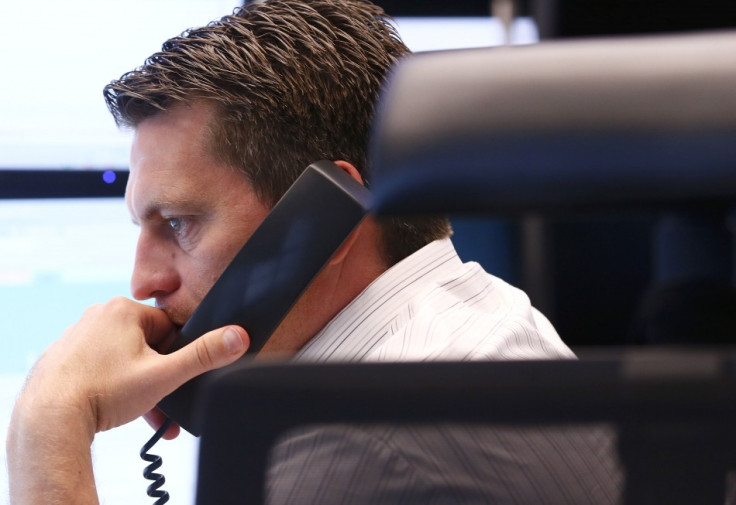US Debt Default Worries Weigh on European Markets

European markets witnessed mixed trade in the opening minutes and traded lower afterward as fears of a US credit default weighed on investor sentiment.
The Stoxx Europe 600 index opened 0.1% lower t0 308.92
Britain's FTSE 100 opened 0.2% lower.
France's CAC 40 opened 0.1% lower.
Germany's DAX 30 opened flat.
Italy's FTSE MIB was trading 0.10% lower.
Spain's IBEX 35 was trading 0.04% lower.
The US government shutdown will enter its second week on 8 October.
On 7 October, President Barack Obama said he would accept a short-term increase in the government's borrowing limit to avoid a credit default. This would buy the Democrats more time to negotiate a long-term solution with the Republicans.
The world's largest economy will run out of cash to pay its bills on 17 October if the government's borrowing limit is not raised. The country's laws limit its borrowing to $16.7tn (£10.4tn, €12.3tn). Market analysts say that the Treasury would probably not be able to pay its bills if the ceiling is not raised.
Yields on one-month Treasury bills continue to head higher this week, a sign that market participants were getting even more worried about the prospect of a US government default, reported CNBC.
Data from Germany showed that the country's trade surplus widened to €15.6bn in August from €15bn in July. Market players will also be tracking German factory orders data for the month of August, due later in the day.
Elsewhere, in Switzerland, the country's unemployment rate remained unchanged for the fourth consecutive month, at 3.2% in September.
In company news, telecoms major Alcatel-Lucent is expected to slash 10,000 jobs as part of a strategy to cut costs by €1bn.
"Given that the [US] government shutdown has reduced the number of market moving US data releases on tap, tensions surrounding the US budget and likely debt ceiling impasse continue to weigh on sentiment. Signs that senior Republicans are becoming less focussed on defunding Obamacare hint at potential for a compromise but a deal looks a long way off and nervousness is set to grow ahead of the October 17 debt ceiling deadline," Credit Agricole said in a note to clients.
In Asia and the US
In Asia, the Japanese Nikkei finished 0.30% higher on 8 October. South Korea's Kospi ended 0.42% higher while Australia's S&P/ASX closed 0.23% lower.
Earlier in Asia, markets outside Australia traded higher after data showed that China's services industry continued to expand in September, albeit at a slower pace.
In mainland China, financial markets resumed trading after the Golden Week holidays.
The Markit-HSBC China services purchasing manager's index (PMI) dipped to 52.4 in September, from August's 52.8. However, the September reading remains well above the neutral 50-mark that separates expansion from contraction. A rise in new business compensated for the slowdown in new orders, according to the survey.
In Japan, government data showed that the country's current account surplus for August stood at 161.5bn yen, below economists' expectations.
Elsewhere, in India, the country's central bank unexpectedly cut a benchmark interest rate in a bid to improve liquidity in the financial market, reversing from its earlier tightening measures in line with the rupee's weakness.
The Reserve Bank of India (RBI) lowered the marginal standing facility (MSF) rate - the rate at which scheduled banks borrow funds overnight from the RBI against government securities - by 50 basis points to 9%. The news boosted Indian stocks.
"There was no bad news over the National Day holiday week, so [Chinese] stocks are turning slightly higher," Tang Yonggang, analyst with Hongyuan Securities told Marketwatch.
However, "it's a pretty fickle market out there at the moment," Shane Oliver, head of investment strategy at AMP Capital told CNBC. "Markets are going to remain quite volatile" amid the US budget discussions.
Wall Street Down
On Wall Street, indices ended lower as the US government shutdown entered its second week.
The Dow finished 136.34 points lower at 14,936.24, dropping to a four-week low.
The S&P 500 closed 14.38 points lower at 1,676.12, while the Nasdaq ended 37.38 points lower at 3,770.38.
The CBOE Volatility Index (VIX), broadly considered the best gauge of fear in the market, jumped more than 13% to trade near 19, hitting a new three-month high.
© Copyright IBTimes 2025. All rights reserved.






















